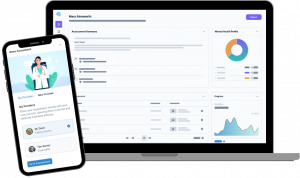There may be an app – thousands in fact – for that, but do they really help?
Mental health apps (MHA) are big business. The global market was said to be $32.4 billion last year, and it will eclipse $100 billion by 2030, if its steady growth rate of more than 14 per cent continues on pace.
A growing infatuation with smartphone and Internet-based apps that collect and track individuals’ health-related data with the goal of improving overall mental health and physical fitness is a major factor driving the growth curve.
Unfortunately, so is our growing need for mental health support.
Five million Canadians just 15 years of age or older suffer from what could be diagnosed as a anxiety or mood disorder; eight in ten Canadians say they want or need access to mental healthcare.
But with a shortage of mental health caregivers and a lengthening of wait times to see them, the Internet and smartphone apps may fill the void, as evidence in support of their efficacy is gathered by testing, trialling, and personal experience. Mental health apps can include a range of features that allow the user to monitor their own emotional health but also interact with care providers if desired or needed.
And now, two Canadian mental health care app developers are independently interacting with mental health therapists, health care providers and those seeking help as they fine-tune their offerings for general release.
Mindfulness, mood tracking, and relaxation are seen as popular features of an MHA, while helpfulness, availability and fun are among the top reasons for using one. Most apps offer access to various self-help resources, making professional mental health support more accessible.
Most apps can also incorporate personalized content, so each person can get tailored recommendations based on their individual needs and preferences. Customization helps any user feel more connected to just about any app, and that’s particularly useful on the mental health journey.
Having some sort of road map for that journey would also be useful. So, it’s good to hear that there’s a national Canadian framework with key standards for safe and effective mental health apps being developed.
The Mental Health Commission of Canada created the framework, along with interested and involved parties across the country and with the support of Health Canada and a group called the Organisation for the Review of Health and Care Apps.
(It’s not just smartphone apps, either: with the growing use of various e-solutions for mental health across the board, the Mental Health Commission developed the first E-Mental Health Strategy for Canada, building on its mental health work and the lessons learned from successful initiatives around the world.)
Consulting with interested and involved partners is what two Canadian developers are doing as their MHA comes to market.
HiBoop, a new mental health assessment platform from a Victoria, B.C.-based tech start-up, reports it is in a Clinical Pilot Program with The Healing Institute at Forbidden Plateau, a top mental health and addiction treatment centre on Vancouver Island.
HiBoop will work with healthcare professionals there during the three-month pilot to refine the platform’s mental health self-assessment tools that individuals can complete at their own pace and in their own space. The pilot will gather clinical feedback from both practitioners and patients about assessment accuracy, user experience, and the program’s integration in clinical environments.
Using a scientifically backed algorithm that randomizes questions, the HiBoop platform generates reliable scores across various conditions. These results are compiled into a holistic mental health profile, guiding healthcare providers toward appropriate care based on insights into a patient’s mental health. HiBoop assessments are aligned with what’s known as DSM standards, from the Diagnostic and Statistical Manual of Mental Disorders. The upcoming DSM-6 is expected to be a significant milestone in the field of mental health, bringing about a host of advances in mental health assessment and diagnosis.

HiBoop mental health care app is now in a clinical pilot and the company is also signing people up to join in its beta test program.
“Our platform isn’t just about simplifying assessments – it’s about supporting healthcare providers by giving them clearer, more actionable insights,” stated Jason Morehouse, HiBoop’s founder. “This pilot is a collaborative effort, and the feedback from clinicians will be instrumental in fine-tuning HiBoop to become an indispensable tool in mental health care.”
Meanwhile, the company is also signing people up to join in its beta test program, which the company describes as “more than a beta test; it’s an invitation to join a community dedicated to breaking new ground in mental health care” using compassion, understanding, and cutting-edge technology.
Another new Canadian mental health app has just been deployed at some 30 mental health clinics in Ontario and Alberta as part of a feedback gathering and app-refining process.
Called Doro, it’s an AI-powered app and chatbot designed to help people exhibiting early signs of a mental health condition.
The app combines computer science and psychology research and was a winning entry in the recent Velocity Pitch Competition.

Doro’s Rastin Rassoli describes a mental health care app at the Velocity Pitch Competition Semi-Finals.
Co-developed by Rastin Rassoli, a student at University of Waterloo, Doro was ‘trained’ on Large Language Models (LLMs) built from publicly available therapy session data. The development team also researched therapy techniques to address common conditions, like insomnia and anxiety.
Based on a data-driven questions, the bot asks about current mental health, personal status, current feelings or emotions. The app will ask if someone wants to discuss their feeling or use other techniques, and it can recommend different cognitive and behavioural therapies, including journaling, exposure or mindfulness.
Depending on the situation, the app will recommend different therapies or exercises, from deep relaxing breathing to a grounding routine based on the five senses (what do you see, hear, touch, smell or taste, for example).
It’s been introduced at the Campus Wellness service and now the provincial clinics; it, too, is now signing up people who want to track their mental health over time.
Which may be all of us.
# # #
Knowing that there are mental health apps on the Canadian market and in development is good news for many people who are looking for some self-support and mental health assistance here.
But, if you are in distress now, you can call or text 988 at any time. It’s a free suicide prevention and crisis support line for everyone in Canada.
-30-



